On the contrary, I want to remind myself: more or less, the question of which author or work to translate should always be a matter of consideration rather than a matter of carelessness.
More than ten years ago, I wondered how Nguyen Nhat Anh's works would be received in another language. The question "Why translate Nguyen Nhat Anh?" came back to me more directly when, with my friend, Kaitlin Rees, I translated his fourth book into English: There are two cats sitting by the window (Tre Publishing House, 2025). (The previous three books we translated: I see yellow flowers on the green grass , Wishing you a nice day , Sitting and crying on the tree ).
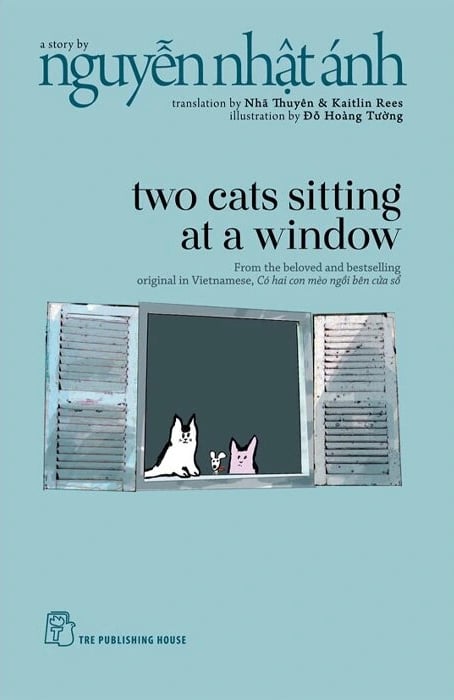
Cover of the book There were two cats sitting by the window (Tre Publishing House) - translators Nha Thuyen and Kaitlin Rees
PHOTO: PROVIDED BY THE AUTHOR
Besides the fact that it is a literary fate - working with the author as well as ordering from the publisher, I want to take the opportunity to be forced to read deeply some of the works I translated to look back, or look more broadly at the creative achievements of Nguyen Nhat Anh, an author who brought me and my friends hearty laughs when I was ten or eleven, in a small town at a time when books were not as easily available as they are now.
Translating Nguyen Nhat Anh is not too challenging, nor is it easy when touching on everyday language and specific cultural spaces and habitats. That difficulty requires me to reread, to finish, an author from my childhood, and to remember a reading memory.
A bestseller, of course, is not necessarily a literary phenomenon. In the case of Nguyen Nhat Anh, the number of books sold is living proof of the appeal of his works to teenage readers, and at the same time, a proof of his quality and personality as a writer. In front of books that always make it to the bestseller lists in the somewhat bleak literary scene for teenagers, one can always hear the skeptical grumbling voice of an absent, demanding reader, that he writes "easy", "repetitive", that "needs critical voices, academic analysis". But the books are still written, the author continues his journey of cultivating words and taking care of his readers.
Approaching Nguyen Nhat Anh, I intentionally wanted to put aside trendy words, statistics on book sales, awards, and titles, to understand him and read him only as a writer - the one who writes books, because I believe that is my purest way of behaving from the perspective of a reader - a translator.
Nguyen Nhat Anh, poet of school age
I belong to the generation of readers - right around the age of Nguyen Nhat Anh's characters, maybe around the age of his daughter - who received the Kaleidoscope series from the first volumes and waited every month for the uncle who rented books in town to bring back new volumes of the purple-covered pocket book series of Kim Dong Publishing House from Hanoi , of course, along with a series of other books from the Golden Bookcase , or thin, rectangular-sized novels from many different publishers, conveniently reading all 10 to 20 volumes at once in idle afternoons.
Later, when I found his first poems and the collection of poems published with Le Thi Kim, April City (1984), I imagined that Nguyen Nhat Anh was, and always will be, a poet of school age, of a city, with stories, memories, skies and life wrapped up. His poetic personality appeared most clearly, perhaps in the work There are two cats sitting by the window : a poet named Meo Gau, a reader who became poet named Tiny, an author who occasionally inserted his own poems into the story to remind readers of his poetic nature, and he himself was translating cat-language poetry into human-language poetry.
As a young reader, Nguyen Nhat Anh's gentle stories, narratives that delve into the small corners of life with his witty storytelling and familiar language like everyday speech made me curious. When reading from a retrospective distance, I was more interested in the way he asked questions about social and humanistic issues, thinking about the potential influence of his works on teenage readers, especially when considering the wide reception of the works, not just the matter of writing style and literary techniques.
We can expect further criticism and research on Nguyen Nhat Anh's perspective on those social and humanistic issues, as well as his limitations and prejudices, if any, such as the implicit inequality between rural and urban areas (for example, expressed through the motif of budding student love couples being separated because one leaves the village for the city, or the story of the wandering living space of poor groups), environmental and natural issues, the voices of animals, and along with it, how love stories and friendships transcend boundaries, differences, and prejudices.
The innocent book page opens up a present dimension of nostalgia
What makes me most comfortable when reading Nguyen Nhat Anh in the present tense, may be what our generation, and then our children's generation, growing up in popular discourses on globalization and economic development, more or less lack: a fresh and authentic sense of community. In most of his works, the Vietnamese communal lifestyle - the village - is bold and vivid in the personalities and relationships between the characters, in the details of the living scenes, whether the story is set in the countryside or the city, in our country or in another country.
As in There Are Two Cats Sitting by the Window , the community of mice, cats, symbiotic groups of mice and birds, of humans, despite the uncertainty of violent invasions, still exudes a tender and poetic beauty. That community may have only two cats, or just one cat and one mouse watching the rain and talking about illusory love affairs. In villages within cities, cities like villages, fathers and mothers can become kings and queens and children can become princes and princesses creating fairy tales, and species are always curious to learn each other's languages. Children grow up familiar with the trees, the alleys of the village, and do not refuse to listen to adults tell stories about the past of their ancestors and grandparents. That is the water that nourishes a warm, trustworthy world , where we are never too lonely, a world of twists and turns, but not dramatized and always has a little hope, because there is still the sharing of everyday life with neighbors, friends, and strangers.
I think, in part, it is this sense of a living, existing community that makes Nguyen Nhat Anh's works, in Vietnamese or in other languages, have the potential to connect readers - Vietnamese descendants living in many different places, or to share between neighboring cultural regions, such as Southeast Asian communities. Reading Nguyen Nhat Anh, I sometimes find myself restlessly entering a living archive, of a lost, lost community living space, and the innocent pages of the book can open up a present dimension of nostalgia.
The little reader in me has remained in the old town. But sometimes, living before the life of an old person, I calmly rely on the simple joys of memory. In today's cluttered cultural space for children and teenagers, Nguyen Nhat Anh's books still exude the innocent beauty of an adult affectionately watching children play, an adult talking to growing children about life values without raising his voice. I imagine adults, like Nguyen Nhat Anh, like the giant in Oscar Wilde's fairy tale, owning a beautiful garden, opening the door for children to rush in, while he sits still, watching, and those children still carry with them many secrets.
Source: https://thanhnien.vn/nguyen-nhat-anh-nguoi-lam-vuon-185250701102809197.htm



![[Photo] Worshiping the Tuyet Son statue - a nearly 400-year-old treasure at Keo Pagoda](/_next/image?url=https%3A%2F%2Fvphoto.vietnam.vn%2Fthumb%2F1200x675%2Fvietnam%2Fresource%2FIMAGE%2F2025%2F12%2F02%2F1764679323086_ndo_br_tempimageomw0hi-4884-jpg.webp&w=3840&q=75)

![[Photo] Parade to celebrate the 50th anniversary of Laos' National Day](/_next/image?url=https%3A%2F%2Fvphoto.vietnam.vn%2Fthumb%2F1200x675%2Fvietnam%2Fresource%2FIMAGE%2F2025%2F12%2F02%2F1764691918289_ndo_br_0-jpg.webp&w=3840&q=75)








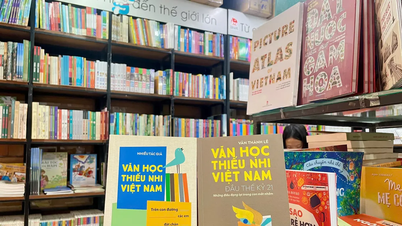



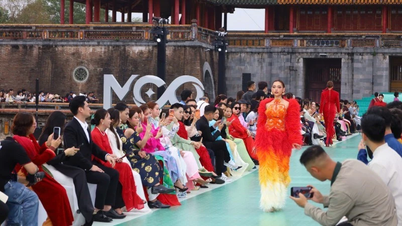

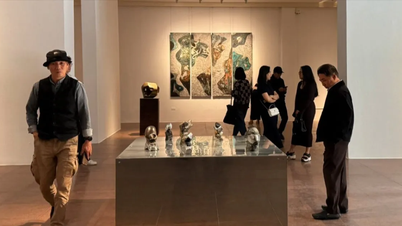








































































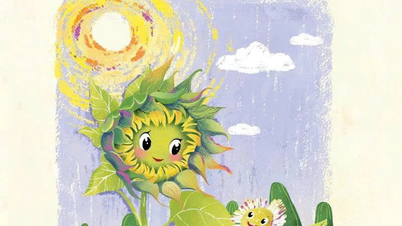















Comment (0)